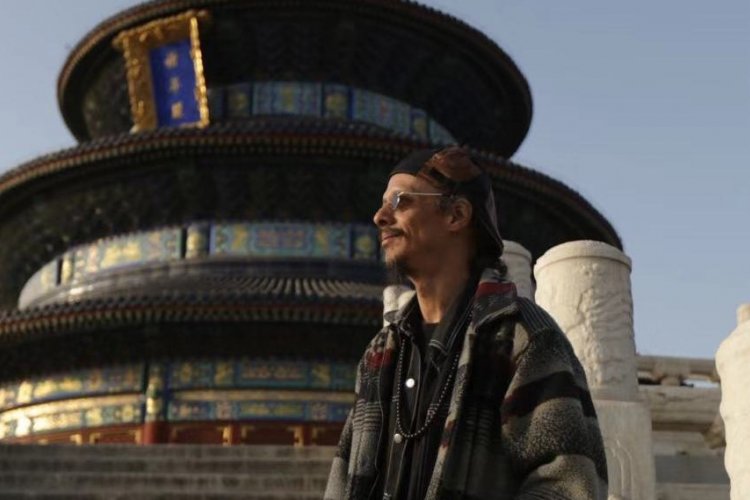Why Biking is Safe: Beijing's Leading Cyclists Talk Two-Wheel Culture
In everyone’s first memories of China there must be a bicycle. Mine is no exception. I am eight, with no intention of ever moving to China, and looking down from a hotel window onto the rainy boulevard below. A patchwork of bicyclists each bedecked in a different color poncho surges across the street in a rainbow river of smooth movement.
Although enough residue of the bicycle kingdom that China once was remains to impress upon foreign memories, things have changed in the last 30 years. Those were the days when the pinnacle of "making it" for a newly married couple could be packaged tidily, as the Chinese language is so apt to do, into the short phrase sidajian (四大件 “the four big items”): a watch, a radio, a sewing machine and a bicycle.
Now, far more revealing is the reply. “I’d rather cry in the back of a BMW,” was a young woman’s recent retort on a TV dating show to her suitor’s suggestion of a bicycle date.
I sat down with Shannon Bufton of Serk Cafe and Ines Brunn of Natooke, who have both been negotiating this moment between the city’s, and the country’s, rich history of the bicycle and a contemporary social climate where luxury cars are now the idealized mode of transport. For them, it’s a matter of fighting against the negative status quo that’s enveloped bicycles, creating a new modern bicycle culture and realizing a return to the cycling utopia that they see in Beijing’s past, and its future.
Can you help us put Beijing biking in context?
SB: Beijing is like the ancient Greece of bicycle cities. We did this comparison of the number of daily bike trips in Beijing in 1986 when it had the highest ridership compared to other modern cities that are really getting into cycling. If you look at Copenhagen, which is a small city but with high bicycle rates, it has something like 200,000 bike trips per day. Berlin, which is a bigger city and has a larger population, but also a smaller motor share, has up to 400,000 per day. But Beijing in 1986 had 3.3 million bike trips per day, which is massive in terms of scale compared to anything any other city has experienced.
Why the shift from bicycle to car?
IB: I think it’s a lot about status symbols. Before, people had no personal wealth; it was all communal. You didn’t really have anything. Then suddenly with the opening up of the economy, people could actually earn some money and spend it on something to show others how much they made. Of course, first you need food, then you need to buy a house, and then the next thing is a car.
SB: There are some huge structural problems to the city, too. Forty percent of the population is now in the outer suburbs (Tongzhou, Changping), and it’s just unrealistic for those people to ride. It’s a very different city to that of 1996 when everyone was living within the Third Ring Road. The challenge is how do you get people back on bikes when you have such large distances to cover. So, while, this is a great city for cycling, the structure of where people work and live since modernization has really become less bicycle-friendly.
IB: But still, there is mixed transportation. I have an employee who lives farther out. She takes the subway to Dongzhimen and she won’t just transfer for one station because that’s too mafan. So, she has a small crappy bike parked there and then she just rides to the office from there.
What about the safety of riding in Beijing?
SB: I had a friend visit from Europe and he was saying that the traffic seems very chaotic and there are a lot of cars, but the thing that is different than other cities that I’ve ridden in is that the cars are moving so slowly. It’s actually better to be on a bike because you are more versatile, so you can just move out of the way or stop. It’s not like a modern, Western city where the cars are really traveling quite fast. The traffic systems are optimized, and that’s what makes it so dangerous to bike – when there is a difference between car speed and bike speed. If you move at the same speed as everyone else it is very, very safe. The first thing that I say to people is actually, I don’t think it’s dangerous at all, I think it’s safer than my home city to ride a bike.
IB: And I think so too, definitely. One hundred percent.
SB: And there is one other concept that happens here which I call “negotiated flow ...” In Western cities, we have rule sets where you have a bike lane, a pedestrian zone and a car zone, and there are strong rules for everyone. So if you are moving in the car zone, you indicate, you leave space. If you are going to walk across the road, you look both ways and wait for the green man.
Here in China, you have this kind of mixed concept of everything where chickens, people, bicycles, cars just go everywhere across the road and the pedestrian space. But the difference in that system is that each of those objects has to negotiate personally.
Therefore, you have a system of moving through. Because there are loose sets of rules, when you come to an intersection, everything slows down because they don’t know who should be first since there is no steadfast rule, and you don’t know if someone is going to come flying out of some blind corner. So everyone slows down, you look everyone in the eye, and then you personally negotiate the space, which makes it very, very safe. And if something goes wrong, by the time you’ve slowed down to that speed, it’s just not dangerous at all.
IB: And another thing is that if you see the number of people that used to be on bikes, the people who now drive cars, they grew up on bikes so they know how bikes move. They know that when you are riding straight and you want to turn, you have to lean over.
The flow is just amazing here. It looks chaotic but it’s not. And the negotiation? If you want to be fast then you go fast. If you come to an intersection, it doesn’t matter if you are a pedestrian or a cyclist, if you have eyes like a deer in the headlights and you hesitate, then the car driver will cut in front of you because he sees you have that hesitation and you are unsure. If you just continue walking or cycling, the car sees that you’re just going to go, and he’s going to stop. That’s the kind of negotiating that we’re talking about. It comes naturally.
Watch Chinese people. They don’t look at the cars because they know if they look the cars driver might want to negotiate. If they don’t look, there’s no negotiation possible so the car driver has to stop, and it’s easy, you just cross the road. It’s a very different concept.
SB: You have to get the Western, Cartensian rule-based logic out of your head and think about how the system works here. That’s when it becomes safe and you can appreciate it. But it’s really a different way of thinking.
IB: Just for the record, I do believe there are rules. It’s not like there are no rules or something. It’s just looser how you deal with the rules.
What about that recurring question of pollution?
IB: It’s always funny that people say, “Oh, such high pollution, I’m going to take a taxi.” What kind of air do you think is in the taxi? The taxi doesn’t have a high quality air filter that filters out the PM 2.5 or anything. It’s still the same air. Plus there’s usually a traffic jam or dense traffic where the car is then sucking in air mainly out from the car exhaust in front. There have been studies done that the air inside a car is actually worse than on a bike. And you’re still contributing to the pollution.
SB: When you ride in the city in Beijing, you shouldn’t ride super fast, just at a reasonable pace. And the amount of energy that it takes on a modern bike to ride 16-20 km per hour is the same amount of energy that it takes to walk because the bicycle is a much more efficient vehicle. So people say “well, it’s bad to ride your bike in a polluted city,” but if you use the same energy as walking on your bike, then you are breathing the same amount as if you were walking.
Photos: Sui, Serk, www.thechinawatch.com
Related stories :
Comments
New comments are displayed first.Comments
![]() zhuwensen
Submitted by Guest on Fri, 09/13/2013 - 14:43 Permalink
zhuwensen
Submitted by Guest on Fri, 09/13/2013 - 14:43 Permalink
Re: Why Biking is Safe: Beijing's Leading Cyclists Talk Two...
SB's initials are, uh, S.B.
That seems to be Appropriate
as well as Poetic.
![]() zhuwensen
Submitted by Guest on Fri, 09/13/2013 - 14:40 Permalink
zhuwensen
Submitted by Guest on Fri, 09/13/2013 - 14:40 Permalink
Re: Why Biking is Safe: Beijing's Leading Cyclists Talk Two...
Biking is Dangerous.
Particularly Dangerous in Beijing.
A friend of ours has been laid up for days with a leg injury
that resulted from biking in Beijing.
Validate your mobile phone number to post comments.






